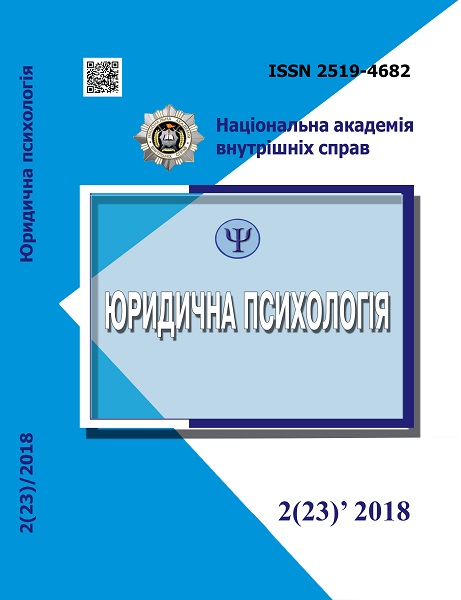Structural-Functional Model of Professional Readiness of a Patrol Police Officer
Abstract
The author analyzes the scientific works that highlight the peculiarities of forming the readiness of future specialists for professional activity. The specifics of the work of the units of the patrol police and the requirements for the formation of professional readiness of the employees are outlined. The essence of the concept of «professional readiness of the patrol police officer» is clarified. It is determined that this is a personality state that allows one to perform official activity at the appropriate professional level and integrates a number of components with the ability to combine them operative, constantly update, accumulate and develop. Based on the research carried out, the structural and functional model of professional readiness of the patrol police officer has been substantiated and developed. The model visually shows components of readiness, which combine to contribute to the achievement of professional readiness. The main components of professional readiness are: professional-theoretical, psychological, physical, tactical readiness and readiness for use, use of firearms. It is determined that the components of the model are: ability to apply the acquired theoretical knowledge during professional activity; sufficient level of formation of special professional skills and skills development and professional qualities; professional experience. The necessary theoretical knowledge is: knowledge of the legislative bloc, legal grounds and the procedure for using police coercive measures, the specifics of the activities of the patrol police units and the characteristics of the patrolling area. The professional skills include: the ability to handle firearms safely, to observe personal safety rules, tactically correct actions during performance of service tasks, and the use of police measures. Developed physical, communicative, volitional qualities are a necessary component of the professional readiness of the patrol police officer. A key factor is the formation and development of these components, against the background of positive motivation for learning and professional activity. It has been established that officers of the patrol police with different levels of formation of the separated components can effectively perform official tasks. The high development of some components can partially offset the low development of others. The high level of professional readiness can be achieved by patrol police officers, provided that they are optimally and comprehensively developed.
Downloads
Abstract views: 394 PDF Downloads: 229
- Authors reserve the right to authorship of their own work and transfer to the magazine the right of the first publication of this work under the terms of the Creative Commons Attribution License, which allows other persons to freely distribute published work with mandatory reference to authors of the original work and the first publication of an article in this magazine.
- Authors have the right to enter into separate additional agreements on non-exclusive dissemination of the work in the form in which it was published in the journal (for example, to post an article in the institution's repository or to publish as part of a monograph), provided that the link to the first publication of the work in this journal is maintained.
- The journal's policy allows and encourages the posting of articles by authors on the Internet (for example, in electronic storehouses of institutions or on personal websites), both before the submission of this manuscript to the editorial office and during its editorial processing, as this contributes to the creation of a productive scientific discussion and positively affects the efficiency and dynamics of citing the published work.




